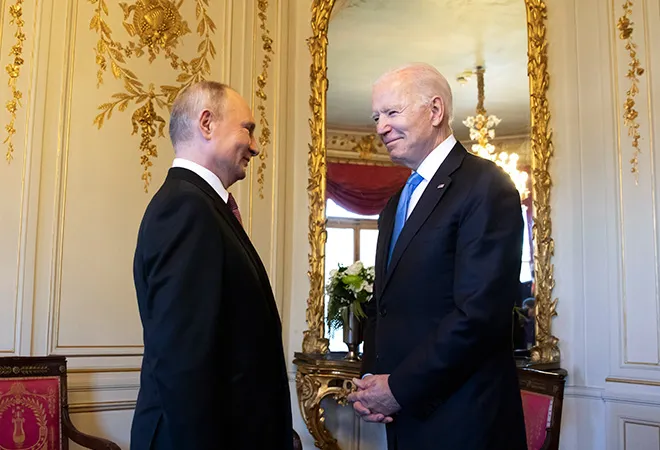
As the US President Joe Biden and Russian President Vladimir Putin wrapped up their bilateral summit in Geneva on June 16 addressing separate press conferences after a three-and-a-half hour discussion, there was a clear shift to a sedate, measured tone on both sides. Biden went so far as to say that there was a ‘genuine prospect to significantly improve relations between our two countries.’
While this does not mean a miraculous turnaround that would end all confrontation in the US-Russia relationship, it does signal progress in returning to discussions that are pragmatic, open, and realist in nature. For a relationship marked by bitter disagreements that had continued to touch ‘new lows’ every few months since 2014, this, in itself, is a major achievement.
The ability of the two leaders to have a ‘constructive’ conversation, clearly communicate red-lines, and restart diplomatic engagement including the return of ambassadors to each other’s capitals is a positive sign in terms of establishing a baseline for any future dialogue.
The ability of the two leaders to have a ‘constructive’ conversation, clearly communicate red-lines, and restart diplomatic engagement including the return of ambassadors to each other’s capitals is a positive sign in terms of establishing a baseline for any future dialogue.
The presidents had discussed a wide range of bilateral issues, including strategic stability, cyber security, status of ambassadors, and the Arctic. There were no agreements signed during the summit, though the two sides did issue a Presidential Joint Statement on Strategic Stability, but, rather, the emphasis was on taking the first steps towards ‘managing the relationship’ despite deep divergences that exist between the US and Russia.
Reiterating the Gorbachev-Reagan declaration that a ‘nuclear war cannot be won and must never be fought,’ officials from two sides have been directed to begin an integrated bilateral Strategic Stability Dialogue. This is a welcome development, given that the new Strategic Arms Reduction Treaty (START) treaty is the sole remaining arms control agreement between the two nuclear powers, and negotiations for what comes next need to begin at the earliest.
Of equally vital importance is the decision on cyber security—to direct experts to ‘work on specific understandings about what’s off limits’—with Biden sharing a list of sixteen critical infrastructures that should be ‘off-limits’ to any cyber attack. In light of the increasingly acrimonious accusations and counter-accusations in the area between the US and Russia, the choice to regulate their behaviour to prevent any escalation due to misunderstandings is a positive move. The reiteration of the Arctic being an area of cooperation, the possibility of compromise in exchange of prisoners, as well as discussion of Iran, Afghanistan, and Syria—all point to the two sides focusing on areas of mutual interest to bring stability in their interactions.
Why is it so important that the US and Russia establish a more stable, predictable relationship instead of the sharp confrontation they have been engaging in over the past years? The answer to this directly relates to the balance it imparts to the international system, where the two countries remain pre-eminent nuclear powers, and their ability to influence regional and global developments through policy decisions remains dominant. This can also be understood through the concerns of over a hundred leading Russian scholars and practitioners in the US, who in 2020 issued an open letter, warning that the ‘US-Russia relations are at a dangerous dead end,’ and there was a need for a ‘change of our current course’ to ‘diminish the risk of a catastrophic conflict.’ In the same open letter, it was also noted that the US policy should seek to move Russian policy ‘needle in the opposite direction’ with regard to the latter aligning ‘with the least constructive aspects of China’s US policy.’
While the depth of the Russia-China relationship would preclude much short-term success on that front, it is clear that a stable relationship with Moscow will help Washington focus its energies more extensively on dealing with Beijing. The efforts in this direction are already underway, as was evident from the focus on China during Biden’s Europe tour. For Russia, a ‘reduction of costs and risks’ to some extent would be fruitful from both domestic and international perspective.
While the depth of the Russia-China relationship would preclude much short-term success on that front, it is clear that a stable relationship with Moscow will help Washington focus its energies more extensively on dealing with Beijing. The efforts in this direction are already underway, as was evident from the focus on China during Biden’s Europe tour
The identification of pockets of cooperation also offers a space for other middle powers to deal with the challenges resulting from an unstable international order. And that cannot fail to benefit countries like India who seek to pursue a multi-dimensional foreign policy based on national interests, and who maintain cordial relations with both the US and Russia.
If the Putin and Biden administrations manage to produce agreements on the areas discussed during the Geneva summit, the benefits would accrue across critical sectors like future arms control and risk reduction, cyber security, European security, Arctic, and even regional issues like Iran, Afghanistan, Syria, and Ukraine.
This is not to say the relations have undergone a ‘reset’ ending Russia-West tensions or that their differences on key issues like the future of the international order have been resolved. However, the move forward from an ‘irrational relationship’ to a more ‘rational confrontation,’ as noted scholar Fyodor Lukyanov calls it, is a reassuring development. What the summit has done is acknowledged each other’s strengths as major powers, as well as the value of cooperating on specific areas to the benefit of both sides, while underlining the value of practical engagement devoid of hyperbole. In other words, the return of quiet diplomacy to US-Russia relations, even with a limited agenda, is welcome news.
The hard work begins now, and the coming months will reveal if the US and Russia are able to indeed build upon the gains of the summit in real terms, and eventually ‘learn to live with each other.’ If successful, it would not only introduce more predictability and stability in the international system, it would also help several middle powers breathe a little easy amid the chaotic churn ongoing in the global order.
The views expressed above belong to the author(s). ORF research and analyses now available on Telegram! Click here to access our curated content — blogs, longforms and interviews.




 PREV
PREV


